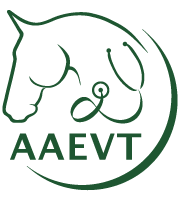Going the Distance….. by Amanda Compton, EDT/LVT
Nearly two decades ago, I started down a path which has taken me to places I only dreamed about, working for veterinary hospitals in the US and the Middle East. Being an equine veterinary technician has allowed me to meet so many wonderful people from a variety of backgrounds and care for countless amazing horses. It has given me a sense of pride and accomplishment which has been a driving force in my life and one that has helped me maintain longevity in an often difficult and sometimes, undervalued, position.
Equine veterinary technicians are in high demand, yet hard to keep and difficult to find in today’s profession. So many talented techs and assistants aspire to work in a veterinary hospital, with an ambulatory practice, or in other specialized areas such as anesthesia, sports medicine, or nursing care. The jobs posted are across the country, in all types of practices and with some advertising vacancies for months. Why is that? If you speak with the doctors hiring, many will say a lack of qualified applicants. If you speak with the potential applicants, it is because of a lack of pay and benefits. I would add work/life balance, but the doctors don’t usually know what that is and could use some themselves! We seem to be at an impasse in the equine veterinary field.
Equine techs are often the most experienced team member when it comes to handling horses, having lived and breathed horses from an early age (like myself), working or volunteering at stables just to get their hands on horses (often given the difficult ones) and are anxious to learn, contribute, and work hard. We work with the recently graduated vets, who are worried about making the right decisions but will not admit it. We work with the experienced vets, who sometimes get in a rush because they have done it a thousand times over. We remain calm when we know either one has to be the bearer of bad news in a terminal diagnosis and has to relay that news to the distressed, hopeful client. We handle the patient with dignity, care and concern and tell the owners how very sorry we are for their loss, often sharing their sadness and tears with them.
We are the ones monitoring the patient while the vet is seeing other patients and trying to stay on time with appointments. We’re the ones who alert the vet to other medical issues while they are honed in on the obvious presenting complaint. We’re keeping mental and written notes of vitals, drugs administered and procedures performed on patients during farm calls or at the clinic. We know how to hang the fluids, attach all the lines correctly and stop that pesky pump from beeping. We are making sure the patient is safe, the client (if present) is safe, and most importantly, the doctor is safe while the horse is being worked up or treated.
The vet techs are organizing your veterinary supply, stocking your vet trucks and pharmacies, and keeping the practice from losing revenue by missed charges, and managing your practice to make it run as seamlessly as possible. We know where to find a new bottle of sedation or flunixin when it runs out and make sure it has been reordered so we never skip a beat. We know how to find those radiographs from last week, troubleshoot the equipment, and remind the vet to put on their PPE each and every single time. We know where the twitch is located when we have a difficult horse who needs an injection and is trying to run us all over.
We lose sleep, miss family time, eat poorly, and often get asked by our partners “How late do you think you will be again tonight?” on a weekly basis, same as the doctors. We own horses (and other pets) who take a back seat to the ones we care for at the practice, so intently. We stress about finances, student debt, relationships, our health, doing so with a quarter of the monthly income. We stay in this profession because we are committed, a little stubborn, love what we do, have empathy for our patients, and because on some level it’s exciting to control a half ton animal with a small rope attached to its head.
Those that leave the profession, usually do so reluctantly. Unfortunately, low income, poor work/life balance, and a lack of professional acknowledgment is not sustainable for everyone. With the increased awareness of burnout, compassion fatigue and suicide that plagues the veterinary profession, we need to remind ourselves and our veterinary colleagues, we deserve the same level of respect and personal boundaries as any other professional. We really want to be here and share in those positive outcomes, utilizing our skills to the highest level of our capabilities for our patients, all the while supporting our doctors and each other. We are a team and together, we can do amazing things!
